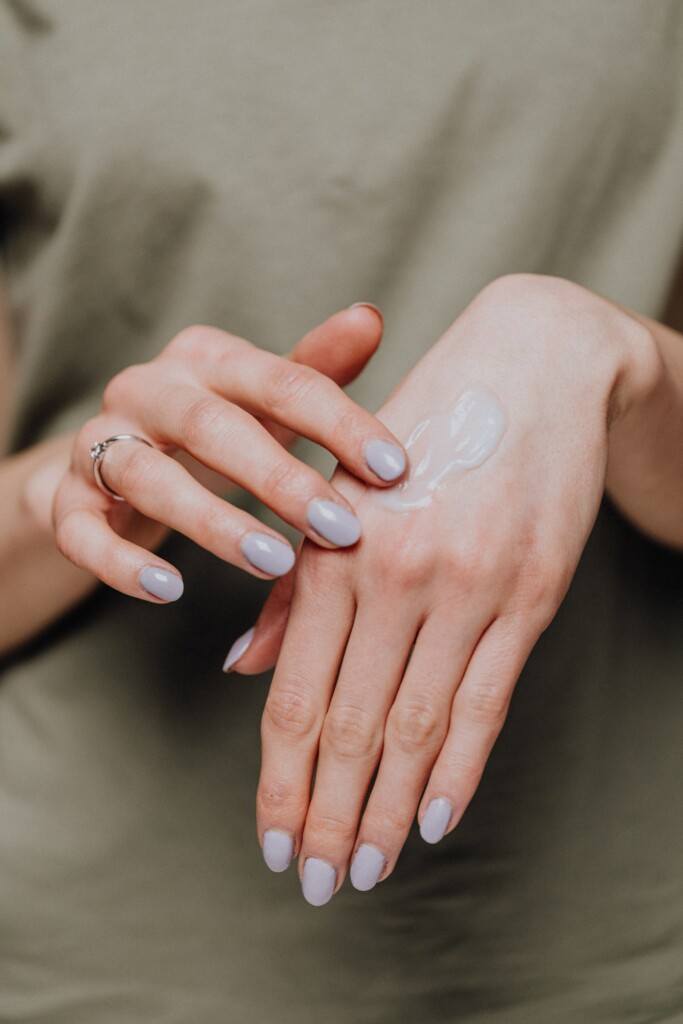
Winter is here – and like every year, our skin has to get used to the new weather. It's freezing cold outside and wonderfully warm - and dry - inside. As soon as we turn on the heating for the first time, we notice the first changes in our skin: it starts to feel tight and itchy, there is an increasing lack of moisture, annoying wrinkles due to dryness appear and the skin on our hands cracks.

In this article you will find out why your skin reacts so sensitively to the change in the weather and the heated air, how you can ideally protect your skin and which six care routine tips will make dry skin in winter a thing of the past.
Why does dry, itchy skin occur in winter?
In winter, our skin is exposed to particularly high levels of stress: both indoors and outdoors, the humidity is lower and the cold also takes its toll on our skin. Above all, the quick change from the bitter cold to the dry heated air and vice versa puts a strain on our skin.
Itchy skin in winter is also caused by the influence of the heating air, which not only removes moisture from the skin, but also attacks the natural skin barrier - the body's own protective mechanism. Normally, our sebaceous glands secrete a protective film of fat that keeps the skin supple. If the temperature drops, the skin reduces sebum production; in extreme cold it can stop producing it completely.
Blood circulation also changes and can lead to dry skin in winter. Cold causes the blood vessels under our skin to contract to retain the body's heat. As a result, the skin has poorer blood supply, which also reduces the supply of oxygen and nutrients. This undersupply can cause symptoms such as feelings of tension, itchy skin or extreme dryness.

6 tips for dry skin in winter
Do you suffer from skin changes every year in the cold season? With our six tips you can prepare your skin ideally for winter and prevent dryness and itchy spots.
1. Tip: Your skin type determines the care products
Have you ever dealt intensively with your skin or even yours? Determine skin type let? If not, you should do so as quickly as possible, because knowing your skin type is the basic prerequisite for finding the right care for dry skin in winter.
It is also important that you do not choose the cheapest options: these often contain mineral oils or paraffins, which irritate and dry out your skin. Especially if you have sensitive skin, you should make sure that your care products contain as few ingredients as possible and no additives such as dyes, fragrances or alcohol.
You don't know what skin type you have or you just can't find the right care products for itchy skin in winter? Then seek advice either from your trusted cosmetic studio or from your dermatologist.
2nd tip: If you have itchy skin, avoid hot water in winter
Do you scurry out of your warm bed early in the morning and straight into the hot shower or do you prefer to relax in the steamy bathtub on cold winter days? You should avoid doing this in the future if you have dry skin in winter, because: Hot water in combination with soap or shower gel attacks your skin's natural protective layer and can lead to extreme skin dryness or itching.
Therefore, make sure that your water temperature does not exceed 39 °C. When soaping, limit yourself to areas of the body that are less sensitive, such as the arms and legs. You should not enjoy your well-deserved relaxing bath for longer than 10 to 15 minutes, otherwise your skin will lose moisture. Ideally, you should also use a moisturizing oil bath that nourishes your skin.
3rd tip: Cold protection for dry skin in winter
The more your skin is supplied with care products, the better prepared it is for the constant temperature changes between the warm inside and the cold outside. When it comes to facial care in winter, the following applies: reduce the water content in your care products and increase the fat content. For dry skin in winter, fats such as almond, jojoba, wheat germ oil or shea butter work wonders because moisturizing ingredients form a protective film on your skin, locking in moisture and nutrients.
You can also use a serum underneath your nourishing cream to combat dry skin in winter. Just a few drops are enough to provide your stressed skin with a good dose of care. Serums with ingredients such as hyaluronic acid, Aloe vera, vitamin C, peptides and collagen.
Sensitive parts of the body in particular need help with dry skin in winter: Protect the delicate skin of your lips with greasy creams, especially in the cold season. You should also care for areas such as legs and elbows daily to keep your skin supple.
4th tip: Beautiful hands despite itchy skin in winter
Frequent hand washing has been part of our daily routine since Corona. But with the pandemic and the associated hygiene measures such as regular disinfection, our skin on our hands is being put under additional strain, as disinfectants often contain a high proportion of alcohol.
To avoid dry skin in winter, you should use a mild, pH-neutral soap, always wash the soap off well and dry your hands completely. You can also provide your skin with moisture and nutrients with a good hand cream.

If you often wash dishes by hand, this can also dry out your skin: dishwashing detergents have a strong degreasing effect and also remove important oil from your skin. The same applies to cleaning products. Therefore, always do the dishes or clean the house with protective rubber gloves.
On the way to work or on a winter walk, you should protect your hands from the cold: apply cream to your skin before you leave the house and wrap your hands in warm gloves. This will help you prevent cracked skin and sore hands.
5. Tip: Increase the humidity indoors
Dry heating air removes valuable moisture from your skin and ensures that the climate in your interior is dry and unhealthy. Through regular ventilation, you can improve the air quality in the rooms and thus reduce dry skin in winter. Your lungs will thank you too.
In addition to regular ventilation, you can also increase the humidity in your rooms with houseplants. Plants have the ability to evaporate irrigation water through their leaves, thereby increasing the humidity. This in turn ensures that your skin does not dry out.
Our SOS tip for dry, itchy skin in winter: place bowls of water on your radiator. These release moisture into the room, increase the air humidity and improve the overall indoor climate during the heating season. This keeps your skin supple.
6. Tip: Combat dry skin in winter with professional treatments
Despite appropriate care, your dry skin can become a problem in winter: If creams, serums, etc. no longer help, you should seek professional advice - either from a dermatologist or a trusted cosmetic studio. We at Sanft & Schön in Berlin Mitte offer numerous facial treatments that will immediately improve your itchy skin in winter.

Our Aquafacial Hydrates dry and sagging skin and ensures a flawless complexion. The innovative vortex technology releases antioxidants, Vitamins, hyaluronic acid and botox-like substances are incorporated into your previously cleansed skin. Thanks to the opened pores, the highly effective substances can penetrate into the deep layers of the skin and develop their effect there. Reduce large pores, impure skin clearing and rejuvenating the skin are positive side effects of the treatment.
Conclusion: Our 6 tips work against dry skin in winter
Are you plagued by dry, itchy skin every year in winter? With our six tips, your skin will survive the cold season unscathed! It is important that you use care products with a high fat content that still suit your skin type.
Also avoid long baths and hot showers, which put additional strain on your skin and remove moisture. You should moisturize sensitive areas of your body such as your lips or legs every day with a rich moisturizer - the same applies to your hands, which must also be protected from aggressive cleaning agents and bitter cold with the help of gloves.
To avoid dry heating air indoors and improve your indoor climate, you can ventilate regularly, set up water bowls or improve the air quality with houseplants. Your dry skin in winter will thank you!
Our professional facial treatments at Sanft & Schönalso provide quick relief for itchy skin in winter: whether hydrating Aquafacial, nourishing mask or luxurious moisturizing treatments – with us your skin gets exactly what it needs. We would be happy to advise you in detail and look forward to your visit!